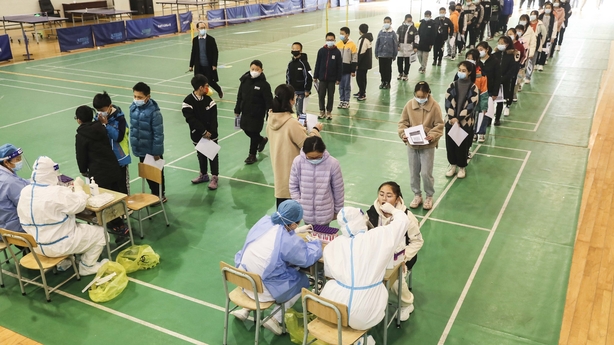Tens of millions of people were under lockdown across China, as surging virus cases prompted the return of mass tests and hazmat-suited health officials to streets on a scale not seen since the start of the pandemic.
China reported 5,280 new Covid-19 cases today, more than double the previous day's tally, as the highly transmissible Omicron variant spread across a country that has stuck tightly to a zero-Covid strategy.
That approach, which pivots on hard localised lockdowns and has left China virtually cut off from the outside world for two years, appears stretched to the limit as Omicron finds its way into communities.
At least 13 cities nationwide were fully locked down as of this morning, and several others had partial lockdowns, with some 15,000 infections reported nationwide in March.
Health officials urged people over 60 to get vaccinated, including the third booster jab, as soon as possible.
Around 80% of people in that age group are double-vaccinated, according to official data.
Beijing is anxiously watching the situation in Hong Kong, which now has the world's highest virus death rates due to low inoculation among its oldest residents.
Official Jiao Yahui said at a press briefing that "the risk of severe illness is very high" for people in that age group.

The northeastern province of Jilin has been worst hit by Omicron with over 3,000 new cases, according to the National Health Commission.
Residents of several cities there including provincial capital Changchun - home to nine million people - are under stay-at-home orders.
Health officials said over 8,200 Jilin residents have been hospitalised, with the vast majority showing mild or no symptoms.
Shenzhen - the southern tech hub of 17.5 million people - is three days into a lockdown with many factories closed and supermarket shelves emptying, while China's largest city Shanghai is under a lattice of restrictions.
City officials said "it is not necessary to lock down Shanghai at present", instead opting for more "precise" measures.
Scenes of closed neighbourhoods, panic buying and police cordons cast back to the early phase of the pandemic, which first emerged in China in late 2019.

Although cases from the chaotic initial outbreak in early 2020 are widely believed to have been under-reported, life since then had largely returned to normal in China under its strict zero-Covid approach.
But as lockdowns edge closer to Beijing, public venues have tightened their scrutiny of ubiquitous health QR codes.
Experts forecast a dent to economic growth as the virus billows out.
"Renewed restrictions, notably the lockdown in Shenzhen, will weigh on consumption and cause supply disruptions in the near term," Tommy Wu of Oxford Economics said in a briefing note.
He added that it will be "challenging" for China to meet its GDP growth target for the year of around 5.5%.
Dozens of domestic flights were cancelled, and aviation authorities said more than 100 international flights bound for Shanghai would be diverted to other Chinese cities between next week and 1 May.
Germany reports record Covid-19 incidence before easing curbs
Germany has reported a record high seven-day incidence of the coronavirus, just days before the planned easing of restrictions.
The Robert Koch Institute (RKI) registered 198,888 new infections, that is 42,000 higher than a week ago, bringing the total number of infections to more than 17.4 million.
The seven-day incidence rose to a new high of 1,585.4 infections per 1,000 people, up from 1,543.0 the day before. Another 283 people died, bringing the total to 125,873 people.
This week, the government wants to adopt a slimmed-down law that will significantly reduce restrictions around Germany. The existing law expires on Saturday.
The government argues that even though cases are rising, there is no longer a major risk of overloading the health system.
Limited protective measures will still be possible in hotspots with high numbers of infections.
Australia to lift entry ban for cruise ships after two years
Australia said it would lift its entry ban for international cruise ships next month, effectively ending all major Covid-related travel bans after two years and boosting a tourism industry hit hard by the pandemic restrictions.
Australia banned the entry of cruise ships in March 2020, when they were the source of about 20% of Australia's early coronavirus infections.
The vessels became a flashpoint in its pandemic response after symptomatic passengers were allowed to disembark in Sydney, many of whom later tested positive.
The federal government said it would not renew the current ban beyond 17 April as the country begins to live with the coronavirus after reaching higher vaccination levels. Last month, Australia fully reopened its airports to vaccinated international travellers.

Before the pandemic, Australia welcomed more than 600,000 cruise ship passengers across its ports from almost 350 vessels in 2019, according to official data, a major source of revenue for the country's A$60 billion tourism industry.
"I can't wait to see our cruise terminals once again filled with arriving international passengers, getting this important industry ship-shape and back out on the water once more, "Minister for Home Affairs Karen Andrews said in a statement.
The further ease in restrictions come amid the threat from the highly contagious BA.2 sub-variant of the Omicron coronavirus strain, which authorities have warned could double daily infections in the next four to six weeks.
Despite calls from health experts to reintroduce some curbs, including making masks mandatory in indoor venues, Prime Minister Scott Morrison over the weekend said the country was ready to live with Covid-19 as though it were the common flu.
More than 31,000 new cases and 21 deaths have been reported by today, with South Australia and the Northern Territory due to report. Australia's total tally stands at just over 3.2 million confirmed cases and 5,612 deaths.

